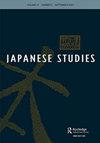Between Jeju and Hanshin: Intimate Migration
IF 0.4
Q3 AREA STUDIES
引用次数: 0
Abstract
ABSTRACT The Great Hanshin Earthquake, which struck western Japan on 17 January 1995, ushered in a year of social, economic, and political upheaval. In his prize-winning short story ‘“Aboji” o fumu’, Oda Makoto employs the earthquake to explore this broader upheaval and the unresolved postwar tensions that it revealed, in particular the legacy of Japan’s colonization of Korea. This article offers a close reading of Oda’s story, contextualizing it within his other writings, the events of 1995, and broader postwar history, particularly the migrant flow between the Korean island of Jeju and the Hanshin (Osaka-Kobe) region. It examines how Oda uses images of land and water, fixity and flow, to undermine the coherence of the nation and substitutes an understanding of the colonial legacy grounded in the local. This reading offers an example of how to recognize the significance of this year of upheaval, as it is represented in Japanese cultural production in and around 1995, as marking the start of a rupture with the postwar order that would be confirmed two decades later by another, greater catastrophe at Fukushima.济州与阪神之间:亲密的迁徙
1995年1月17日发生在日本西部的阪神大地震引发了一年的社会、经济和政治动荡。在他的获奖短篇小说《Aboji o fumu》中,Oda Makoto利用地震来探索更广泛的动荡和它所揭示的未解决的战后紧张局势,特别是日本殖民朝鲜的遗产。本文对小田的故事进行了细致的解读,将其置于他的其他作品、1995年的事件以及更广泛的战后历史背景中,尤其是韩国济州岛和阪神地区之间的移民流动。它考察了小田是如何利用土地和水、固定和流动的形象来破坏国家的一致性,并取代了对扎根于当地的殖民遗产的理解。这种解读提供了一个例子,告诉我们如何认识到这一年动荡的意义,因为它体现在1995年前后的日本文化生产中,标志着与战后秩序决裂的开始,而20年后,另一场更大的福岛灾难证实了这一点。
本文章由计算机程序翻译,如有差异,请以英文原文为准。
求助全文
约1分钟内获得全文
求助全文

 求助内容:
求助内容: 应助结果提醒方式:
应助结果提醒方式:


